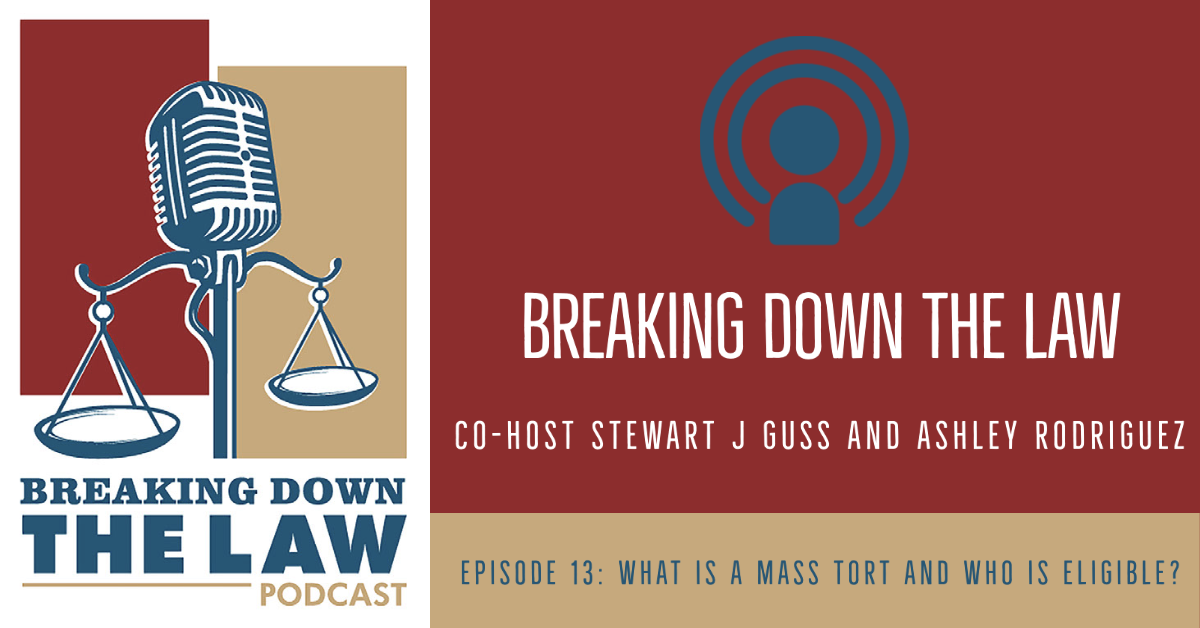For this episode of the Breaking Down The Law Podcast we’re joined by Tiffany Little, a Mass Torts Specialist. She’s joined by Breaking Down The Law Podcast host, Ashley Rodriguez.
During today’s episode, we’ll be learning exactly what a mass tort is?
- What is a Mass Tort Case?
- What is the difference between a Mass Tort and a Class Action Litigation?
- The main difference between mass torts and class actions is how the large group of plaintiffs is treated.
- Is it still safe to consume the medications or still have the device implanted?
- What if someone is experiencing issues from a medication; how do I find out if there is a potential claim/lawsuit?
- What if someone doesn’t have the medicine anymore, how will they prove they took the medication?
- What if they already had several health issues and pre-existing conditions? Does that mean they would not qualify for a claim?
- How long do these types of cases usually take?
- What happens if they die and their case is still open?
Tiffany discusses these points and so many more, so we hope you’ll join us for this episode!
Stay tuned for the next installment of the Breaking Down The Law Podcast with Stewart J Guss and Ashley Rodriguez!
Contact Us: 281-783-3934 or [email protected]
If you want to subscribe to our podcasts on your favorite podcasts player click here for all the links to each one!
Transcript [This transcript was created using an automated transcription service and may contain errors]
Intro 0:09
Breaking down the Law a podcast hosted by attorneys and legal specialists discussing everyday law and how it affects regular people, regular people. Let’s break down the law with our host, Stuart Gus Ashley Rodriguez. They have the inside scoop on everything legal and newsworthy.
Ashley Rodriguez 0:34
Welcome to breaking down the law. Today we’re gonna be talking about mass torts. And we have a special guest with us today. Tiffany Little tell us what you do for the firm.
Tiffany Little 0:46
Hello, I’m Tiffany Little I am the manager of the intake department and the referral department with Stewart Guss.
Ashley Rodriguez 0:54
So what exactly is a mass tort case?
Tiffany Little 0:59
A mass tort is a civil action that involves numerous plaintiffs against one or more defendants. In-state or federal court. law firms often use mass media to reach potential places. The main categories of mass torts include medical device injuries, prescription drug injuries, and also medical devices.
Ashley Rodriguez 1:21
Alright, so what is actually the difference between a master and a class action litigation,
Tiffany Little 1:29
the main difference between a both normally has to do with how large the group of plaintiffs is treating. So say, for instance, mass torts often involve a group of distinct individuals, sometimes from the same geographic area. Because of this mass tort typically consists of a small group of injured plaintiffs, then what you would see with the class action suit, although plaintiffs in the mass tort are part of large groups, or they can be, each member is still treated as an individual. So that means that each plaintiff must prove certain facts, including how each person was injured, to the defending. Now, class actions, on the other hand, are handled a little differently in this type. The large group of plaintiffs is considered a class and is represented by an individual called a class representative, the class representative stands in for the rest of the class. All the members are technically treated as one point.
Ashley Rodriguez 2:28
So mass tort, each individual person has to kind of prove their case basically.
Tiffany Little 2:34
Correct. So like their injuries, their approval usage, all of that information is looked at on an individual basis in order to determine what the value would be of any potential claim that they may have.
Ashley Rodriguez 2:46
So it basically in a mass tort, different people could have a different settlement amount. And
Tiffany Little 2:52
that is correct. Yes, ma’am.
Ashley Rodriguez 2:54
If there is a mass tort case against medication or a device that’s implanted, is it okay to still use that medication or keep that device implanted?
Tiffany Little 3:04
Well, honestly, that question will be better suited for a doctor or a medical provider. There are many medications or devices that may still be on the market, all the while they have an ongoing best sort of litigation. So we’d normally just advise people that if you’re experiencing any issues or complications, as a result of any medication or medical device that you may still have implanted, then we highly suggest that you discuss all of these factors with your doctor in detail. And they will be the ones to determine what is the best plan of action with respect to your medical care?
Ashley Rodriguez 3:36
Okay, so that makes sense. So, if the doctor did say anything is removed the device with that affects my case,
Tiffany Little 3:43
no, in most instances, it definitely wouldn’t have any bearing it would just go to your medical treatment. And in fact, several litigations where someone has a medical device implanted, where it is causing issues, that’s one of the things that we look for in a claim to show somewhat of the value of the claim is if, obviously, if a doctor is telling you to remove this device that would equate to that the doctor feels like there’s some type of potential harm or damage that has already caused So that right there would be something that we would technically already be used to when it comes to a medical device type claim. And in most instances, obviously, if it is causing injury, it wouldn’t be something that you would still keep inside your body. But as I stated that would be based on the doctor’s recommendation.
Ashley Rodriguez 4:29
But it could probably help my case, of course, if I had to remove it. So if I’m experiencing issues, like from a medication, how do I even find out that that issue is related to a potential claim or a lawsuit.
Tiffany Little 4:43
honestly, researching the internet is always a good start. I mean, in this day and age, we all know you can pretty much Google anything. So I would suggest starting there, and you can simply google whatever the medication is and put in mass tort or Google that medication and put in the word claims. Obviously, the other way would be to just go ahead and contact the personal injury firm like Stewart J Guss this directly, and then you’d be able to speak with someone who would be able to either advise you of that they are working that specific Master, or they may be able to go ahead and direct you to another firm that they are aware of that might be handling those signs as well.
Ashley Rodriguez 5:19
I got it. What if I don’t use the medication anymore? How will I prove that I took that medication?
Tiffany Little 5:27
Well, there are several ways that you can prove that in most instances, what we’re referring to is proof of usage. So we’re referring to a medication, or it might be provable exposure if you are exposed to some type of defect or something that has to do with a medical device. So the main thing is going to be your medical records and pharmacy records, those are going to come into play and any type of documents that are going to have a record of medication still, what you surgeries you had, obviously, it would be hospital records, if you had something implanted, or maybe it was in a general doctor’s office, it just depends. But most of the time, that’s where we get that information. Now there are times where that information may no longer be accessible, whether it’s due to the statute for how long the state needs to maintain medical records. But that’s why we always shot to suggest that people hold on to their copies of their prescription inserts or keep track of all the pharmacies that they use to do scripts that will prevent that they need to request records. In that time, they would be able to provide the law firm with that information, such as all the pharmacies, they use guarantee a certain timeframe or the pharmacy they know that they filled the prescription with or if it’s a medical device, then you know, the hospital or doctor’s office, wherever they had that specific thing in-plane to they will be able to provide that information. And we will go from there as far as collecting the medical records and being able to prove up the case.
Ashley Rodriguez 6:50
So as a pharmacy required to keep those records and if they are how long do they keep those records?
Tiffany Little 6:57
Yes, pharmacies very much. So just like metal providers are required to maintain records for a certain amount of time that all is subject to the state. And then it also even goes as far as digital records versus regular, like paper records. And you’d be surprised because there are some people that still keep paper records, but most of the time, they require you to keep the digital files for a longer time than what they require you to keep an actual hard file or an actual hardcopy, so that would just depend on the state that you live in. And you can easily look that up on there’s a certain just like the medical board, there’s a pharmacy board, and you’d be able to get all that information regarding how long they are required to maintain the prescription records.
Ashley Rodriguez 7:40
Awesome. But of course, if I had a lawyer, they would call them for me. Correct?
Tiffany Little 7:45
Correct. Most law firms, if they don’t collect medical records in the house, then they will use a company that is specifically hired to obtain medical and pharmacy records. And they would know what to do in that instance, in order to make sure to get the records for the case any visit they had been destroyed. Because like I said, if they only required to keep them for seven years, and say, for instance, this is 10 years later, they may have them in they may not but we still would have to request speaks to the pharmacy to see whether or not those records will still be available. Awesome.
Ashley Rodriguez 8:15
So what if I had several issues, pre-existing conditions will not affect any claim I have for another type of medication or device?
Tiffany Little 8:26
Well, that will depend on the mass tort and what the criteria is to qualify. But it doesn’t automatically mean that you won’t qualify. It could be an instance where your pre-existing condition might not have any correlation to the medication or device in question. So it’s best to discuss this with the law firm you’re in contact with about your potential claim and just make sure you share with them all of your medical history. And then you’ll be able to let you know at that point whether or not your pre-existing condition is something that may you know disqualify you or maybe not even disqualify you may be less of a claim or not the same value as if you wouldn’t have had that pre-existing condition. But all that depends on what the mass sorting is, what the criteria is, and what has been identified as issues as a result of that medication.
Ashley Rodriguez 9:16
So definitely, it’s important to say all of that stuff upfront.
Tiffany Little 9:20
Correct.
Ashley Rodriguez 9:22
So how long do these types of cases usually take before they settle? And I see some sort of some.
Tiffany Little 9:30
Honestly, each master varies a lot. And we try to tell people that it certainly isn’t a swift process in order to help manage expectations. We don’t want people to be expecting, I’m going to get this money in six months or a year or even two years. It takes time to gather medical records. It takes time to go through the discovery phase, the collecting of the evidence, there are so many factors that attribute to mass force, and especially when you’re dealing with larger groups of people. Is there for some have lasted three to five years before recovery was received and many may end in no recovery at all? It just really depends on each master individually.
Ashley Rodriguez 10:11
So yeah, definitely lots of different factors in the air. And you should definitely discuss those kinds of individual needs with your lawyer.
Tiffany Little 10:21
Yes, definitely.
Ashley Rodriguez 10:22
So what happens if someone has a mass tort open, and then they pass away before it sells,
Tiffany Little 10:31
Well, normally is a family or representative who has the power of attorney to handle legal matters on that person’s behalf can continue the case on their behalf and we receive any potential settlement that could be received. In these instances, it can get tricky if there’s not a will on file or a power of attorney already executed prior to the person’s death. So that’s why in some instances, we do, unfortunately, get some clients that we know they’re not doing too well. Or maybe they’re up in age, or they just have a lot of things medically going on where their doctor may be stating that they may not have much time with this lift. And in those instances, we do try to encourage the family or kind of let them know like, Okay, this is the process she needs to do or whether or not they may have to see somebody outside of our representation that has more to do with probate court and being able to work out those matters. But we would just suggest to them to make sure that they go ahead and try to get something in place. Because having something in place prior to the passing of the client will make that process a lot easier is when a settlement is received and needed.
Ashley Rodriguez 11:42
Yeah, and I mean, that’s important. We had an episode about wills and probate, too, and how important it is to protect yourself because you just never know.
Tiffany Little 11:51
that is exactly right. I mean, you just never know. So we definitely try to encourage that, like I said, especially on these mass torts. And a lot of times if people are up in age or they have a lot of medical issues going on partisan instead of a conversation, we definitely try to just explain to them so they can know, you know what they would be dealing with me if they did have a weight on top?
Ashley Rodriguez 12:11
Yes. So Tiffany, if you had to give somebody one piece of advice for looking up a master or to prepare themselves for a possible mass tort that come up in their life, what would you give them?
Tiffany Little 12:26
If I could give one piece of advice to anybody who might be involved in a mass or later on in life, I would say good record keeping, make sure to keep track of doctors that you’ve seen on pharmacies that you’ve used, I take it a step further and keep copies of the prescription printout inserts that they give each time you get a medication, because that’s going to prescribe all of your dosage information, NDC codes, all of that information that could be really, really, really important to a mess or down the line. And the last thing I would say is be completely honest with your doctors, whenever we go to a doctor and they give us medicine. And if we report back that, oh, this medicine gives me a headache. This medicine gives me diarrhea, it gives me a stomachache, all that information, the doctor that has to be reported to the pharmacovigilance. So that they can see if Okay, we have thousands of people that are saying they have the same injury, diarrhea, so now that becomes a side effect. So maybe they put that as a side effect on the medication. So if you’re going to potentially be a part of a tort is very important that you are honest, and everybody’s being honest, they may be able to identify issues with certain medications faster. So I would say good record keeping will be number one, keeping track of all pharmacies, doctors you’ve seen. And the second part is to be completely honest with your medical providers about how you feel how medications make you feel how you’re doing with your help.
Ashley Rodriguez 13:56
Oh, there’s some great tips because I don’t think we often think about our side effects and how it could affect multiple other people and the medication.
Tiffany Little 14:06
Yes, definitely, definitely are helping to pull something off the line that is causing a lot of issues. But if nobody’s speaking up, how will they ever know?
Ashley Rodriguez 14:15
Very true. If you have any other questions, please contact Stewart J Guss and we would love to help you out with a mass tort case. Thank you.
Tiffany Little 14:29
Thank you.





